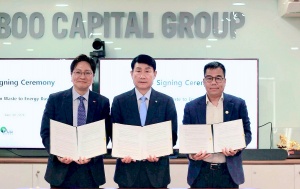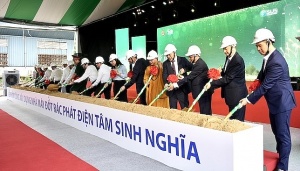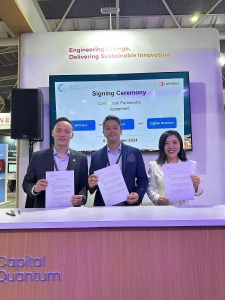BCG hits success with M&A strategy
 |
| Pham Minh Tuan, executive vice chairman, Bamboo Capital Group |
Speaking at the Vietnam M&A Forum 2024 organised by Vietnam Investment Review on November 27 in Ho Chi Minh City, Tuan said that mergers and acquisitions (M&A) have been deployed by BCG for years.
In 2018, when Vietnam issued policies to encourage the development of renewable energy, this field has attracted many investors, including both international and domestic.
Decisions issued in 2020 by of the Ministry of Industry and Trade related to the feed-in-tariff (FIT) price mechanisms have promoted the strong development of solar and wind power projects.
From 2018 to early 2021, Vietnam added 26 GW of renewable energy capacity to the national power system, contributing about 15 per cent of the country's total electricity output, making renewable energy an important pillar in the power industry.
According to Tuan, many international investors were initially apprehensive about the regulations on power purchase agreements (PPA) and the role of the Vietnam Electricity (EVN).
However, the process of working and supporting international investors to better understand the legal environment in Vietnam has helped create trust and attract capital from countries such as Thailand, Japan, and Western Europe.
After better understanding the mechanisms and role of EVN, foreign investors have become more confident. Some international financial institutions have started to participate, despite knowing that issues continue to surround PPA contracts.
Taking advantage of these opportunities, BCG has become one of the pioneers in renewable energy.
The group currently owns 700 MW of capacity from projects already in operation and is deploying an additional 550 MW.
In particular, BCG also invests heavily in waste electricity, with a factory in Ho Chi Minh City that boasts a processing capacity of 2,600 tons of waste per day and is expected to expand to 8,000 tons per day, making the project one of the world's largest waste power plants.
With the goal of reaching 2GW of capacity by 2027, BCG has invested more than VND20 trillion ($833 million) in renewable energy, cooperating with international investors and carrying out M&A deals.
“Our M&A strategy is part of BCG’s development DNA, helping the group expand, enhance its position, and contribute to the sustainable development of the economy,” Tuan said.
A typical example of Bamboo Capital's successful M&A strategy is the acquisition of 80 per cent of AAA Insurance from IAG Group (Australia) in December 2022. At that time, AAA faced many difficulties in the compensation process and customer service, with revenue of only VND196 billion ($8.1 million). After the deal, BCG quickly restructured, repositioned the brand, and invested heavily in human resources and operations.
In 2024, AAA Insurance is expected to reach a total revenue of VND1.5 trillion ($62.5 million) and be in the top 15 best non-life insurance companies in Vietnam.
This success demonstrates BCG’s management capacity and affirms that M&As are not simply a foreign enterprise acquiring Vietnamese enterprises, but also a good lesson for domestic enterprises to acquire and revive companies previously managed by foreign investors.
Tuan also shared his in-depth perspective on M&A deals, especially the factors that create the true success of a transaction.
According to him, the success of a deal is not limited to the time of completing the deal, but also on the next steps, such as restructuring and operating the business after the merger.
"For deals in which the buyer only owns a portion of the shares or builds a co-ownership model, the signing moment is only the beginning of a long-term cooperative relationship. On the contrary, with transactions where the buyer has the control or complete ownership of the business, completing the deal can be considered successful,” he said.
Sharing more about practical experience, he said that BCG has grown thanks to M&As.
“We have taken on many roles as both the buyer and the seller. Thereby, we see a clear difference when working with international and domestic partners,” he said.
International partners' understanding of the Vietnamese market is very different. There are foreign investors who do not know much about the Vietnamese market. “At that time, to have a successful transaction, we needed to accompany and guide them to understand the legal regulations, and coordinate with their consulting units to build a suitable transaction model. This is an important step for both sides to reach an understanding," Tuan said.
He also noted that one of the key factors to getting a deal done is consensus on goals and financial model.
“Reasonable business valuations will help both sides narrow the gap, creating a basis for an effective negotiation process. Negotiation skills play a decisive role because each side has its interests to protect. It is important to find ways to break the ice and reach consensus without affecting the prerequisites of both two sides," Tuan added.
Tuan also mentioned collaborating with professional advisors to resolve questions related to valuation or transaction structure. In many cases, the parties should invite an independent valuation unit to ensure transparency and objectivity.
He noted that businesses need to be careful in calculating the time frame for legal procedures.
When compared to domestic transactions, Tuan commented that Vietnamese businesses are often simpler in terms of legality because both parties clearly understand the domestic business environment. However, one of the common challenges comes from the issue of prejudice and ego.
"Sometimes, competing egos among domestic businesses make reaching an agreement difficult," he commented.
In addition, the domestic transaction process is often less strict than deals with foreign businesses, rarely uses consultants, and does not go through the processes of a standard M&A deal.
“The seller and buyer clearly understanding their roles and each party's process to be able to come up with appropriate solutions,” he added.
At the end of the talk, Tuan said that the success of an M&A deal does not just stop at signing the deal, but also lies in the ability to execute effectively afterwards.
“Only when the business develops sustainably and both parties achieve their goals can the deal truly be considered successful,” he said.
 | BCG Energy teams up with South Korea's SK Ecoplant and SLC for waste-to-energy projects BCG Energy has signed an agreement with South Korea's SK Ecoplant and Sudokwon Landfill Site Management Corp. (SLC) to develop waste-to-energy projects and waste treatment solutions in Long An and Kien Giang provinces. |
 | Construction begins at BCG's waste-to-energy plant A groundbreaking ceremony was held on July 20 for a new waste-to-energy plant in Cu Chi district, Ho Chi Minh City. |
 | Bamboo Capital afforestation arm joins global partners to tap carbon credit market BCG Eco, the afforestation arm of Vietnam’s Bamboo Capital Group, has signed an agreement with Singapore’s Capital Quantum and Corects, two leading entities in carbon credits and climate finance. |
What the stars mean:
★ Poor ★ ★ Promising ★★★ Good ★★★★ Very good ★★★★★ Exceptional
 Tag:
Tag:
Related Contents
Latest News
More News
- BJC to spend $723 million acquiring MM Mega Market Vietnam (January 22, 2026 | 20:29)
- NamiTech raises $4 million in funding (January 20, 2026 | 16:33)
- Livzon subsidiary seeks control of Imexpharm (January 17, 2026 | 15:54)
- Consumer deals drive Vietnam’s M&A rebound in December (January 16, 2026 | 16:08)
- Southeast Asia tech funding rebounds on late-stage deals (January 08, 2026 | 10:35)
- DKSH to acquire Vietnamese healthcare distributor Biomedic (December 24, 2025 | 15:46)
- Central Retail refocuses Vietnam strategy with Nguyen Kim exit (December 24, 2025 | 15:01)
- RongViet Securities wins sixth consecutive M&A advisory award (December 22, 2025 | 17:30)
- Kido Group divests from ice cream and frozen foods (December 18, 2025 | 16:49)
- Insurtech startup Saladin wraps up Series A funding round (December 17, 2025 | 09:10)






















 Mobile Version
Mobile Version